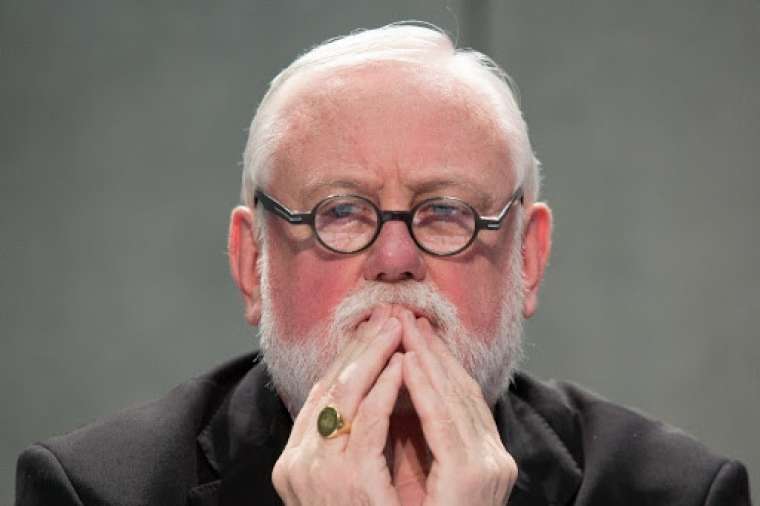Archbishop Paul Richard Gallagher, Secretary for Relations with States within the Holy See’s Secretariat of State, at the Vatican Oct. 27, 2017. Credit: Daniel Ibáñez/CNA.
A Vatican official has encouraged Catholics to apply the Church’s social teaching to evaluate proposals for a “Green New Deal.”
Archbishop Paul Gallagher, the Vatican Secretary for Relations with States, reflected on topic in a 23 January guest lecture for a course organized by the Centesimus Annus pro Pontifice Foundation on “The Church’s Social Doctrine for a Green New Deal.”
He pointed out that the philosophical underpinnings of some Green New Deal proposals contained a modern assumption that technological progress inevitably yields good results.
He said: “The Green New Deal and similar plans do not question either the industrial system, which historically is at the origin of pollution or the financial system of international stock exchanges, but are rather programs that tend to respond to economic dynamics that deal with the environmental problem, directly and indirectly, with electric and autonomous vehicles, various other forms of ecological industry, information technology, artificial intelligence, robotics, and 5G technology, just to name some particularly relevant examples.”
He continued: “We are well aware that it is difficult, if not impossible, to go back to pre-industrial times; we also understand that improvements in science and technology are helping us to reduce the very serious environmental problems facing the world. However, we can never be credible ecologists without a critical eye on the modern idea of progress, understood as the reassuring linear development of human possibilities through unlimited technological evolution.”
“The tragic irony is that such a culture, which imagines the product of man as the supreme, saving and definitive instance, then inexorably ends up destroying man and his environment.”
In his lecture, the archbishop encouraged Catholics to commit themselves to “a constructive dialogue” with advocates of a Green New Deal, saying that a Christian perspective would introduce “precious added value” into the discussion.
To illustrate this, he quoted Pope Francis: “Freeing others from their slavery certainly implies taking care of the environment and protecting it, but even more helping the human heart to open itself with trust to that God who not only created everything that exists but also gave us given himself in Jesus Christ. The Lord, who first takes care of us, teaches us to take care of our brothers and sisters and of the environment that he gives us every day.”
The Vatican official said that “the defence and care of culture” were fundamental to the search for the human good.
“I consider it useful to point out a risk present in today’s political dialectic: the most critical of the logic of profit unwittingly end up supporting it, while its defenders delude themselves that it can preserve those good values to which they declare themselves linked,” he said.
Gallagher pointed out that the term “Green New Deal” today is used by political bodies on different continents to refer to different policy proposals. There was the first proposal in the United States House of Representatives in 2019 by Alexandria Ocasio-Cortez, which was rejected. But the United Nations also promotes a Global Green New Deal and the European Union uses the term European Green Deal.
He noted that U.S. President Joe Biden did not support Ocasio-Cortez’s proposal in all its points during his electoral campaign, but promised to “undertake new environmental policies, reduce greenhouse gas emissions by 2050, invest in renewable energy, improve the state of national construction, and promote the spread of electric cars.”
“For its importance and for its purposes, the Green New Deal is for us a subject worthy of the utmost attention, and it is good to think of it not as a proposal with defined and assessable contents, but as a framework idea within which we can recognize distinct units between them, today and tomorrow, and which therefore will require the rigour of specific assessments,” Gallagher said.
“Nonetheless, the main Green New Deals currently under development tend to represent on the one hand the hope of a historic turning point for the future of the world and on the other an insistence on certain issues that seem to restrict rather than broaden ecological reflection, at the risk of giving it a uniform and aligned look of environmentalism.”
Gallagher noted that the Church, on the other hand, sees that “nature has its own sacredness that needs protection and respect” and that “the norm of the relationship between man and nature is therefore not the pursuit of the useful, but the search for the common good through the reasons of faith.”
“What is commonly called ‘nature’ is a creation for us Christians, the work of God which bears within itself the signs of transcendence and reveals the glory of its creator: as Psalm 19 reminds us, in verse 2, ‘I heavens tell the glory of God and the work of his hands announces the firmament,’” he said.
He argued that “the environment that surrounds us must not be reduced to a place to generate profits, an alternative resource to seek new forms of investment, or a commercial opportunity to increase profits.”
“In fact, nature is a common good that cannot become the prerogative of private companies, nor can it be managed as a state property entrusted exclusively to the action of governments. It is therefore important to think of new economic models that safeguard the environment and guarantee the dignity of every human person,” he said.
Source: CNA

